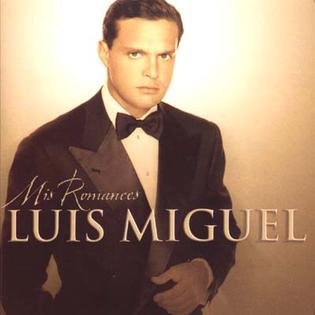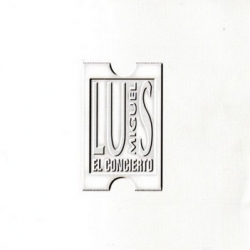
Luis Miguel Gallego Basteri is a Mexican singer and record producer. Born in Puerto Rico to an Italian mother and a Spanish father, he is often referred to as El Sol de Mexico, derived from the nickname his mother gave him as a child: "Mi sol". Luis Miguel has sung in multiple genres and styles, including pop songs, ballads, boleros, tangos, jazz, big band, and mariachi. Luis Miguel is also recognized as the only Latin singer of his generation to not cross over to the Anglo market during the "Latin Explosion" in the 1990s.

Romances is the twelfth studio album by Mexican singer Luis Miguel, released on 12 August 1997, by WEA Latina. It is the third album of the Romance series, in which Miguel covers Latin songs from 1940 to 1978. Aside from Miguel, the production also involved arranger Bebu Silvetti, and Armando Manzanero, who directed all of Miguel's Romance albums. Romances consists of twelve cover versions and two new compositions by Manzanero and Silvetti. Recording took place in early 1997 at the Ocean Way recording studio in Los Angeles, California.

Romance is the eighth studio album by Mexican singer Luis Miguel. It was released by WEA Latina on 19 November 1991. Although the production was originally intended as another collaboration with Juan Carlos Calderón, that plan was scrapped when Calderón was unable to compose songs for the album. Facing a new-material deadline in his recording contract, at his manager's suggestion Miguel chose bolero music for his next project. Mexican singer-songwriter Armando Manzanero was hired by WEA Latina to co-produce the album with Miguel. Recording began in August 1991 at Ocean Way Recording in Hollywood, California, with Bebu Silvetti the arranger.

Segundo Romance is the tenth studio album by Mexican singer Luis Miguel, released on 30 August 1994 through WEA Latina. Like Miguel's 1991 album Romance, Segundo Romance comprises cover versions of boleros written between 1934 and 1993. It was produced by Miguel with Juan Carlos Calderón, Kiko Cibrian and Armando Manzanero and recorded in early 1994 at the Record Plant in Los Angeles.

Aries is the ninth studio album by Mexican recording artist Luis Miguel. It was released by WEA Latina on 22 June 1993. After attaining commercial success in 1991 with his previous album, Romance, Luis Miguel decided to return to a style similar to his earlier work, featuring pop ballads and dance numbers with R&B influences. The record was produced by Miguel, who was assisted by Kiko Cibrian, Rudy Pérez, David Foster, and Juan Luis Guerra.

Amarte Es un Placer is the thirteenth studio album by Mexican singer Luis Miguel. It was released by WEA Latina on 13 September 1999. Produced by Miguel, it is a pop album with R&B and jazz influences. Miguel was more involved with the songwriting on this record than on earlier albums and was assisted by composers including Arturo Pérez, Armando Manzanero, and Juan Carlos Calderón. Despite the popularity of his contemporaries Ricky Martin and Enrique Iglesias who crossed over to the English-language market, Miguel preferred to sing and record in Spanish at the time.

"Sol, Arena y Mar" is a song written by Arturo Perez, Francisco Loyo, and Salo Loyo and co-written, produced, and performed by Mexican singer Luis Miguel. It is a horn-driven uptempo pop song with jazz influence which deals with a strained relationship. The song's lyrics were rumored to have been influenced by Miguel's previous relationship with Daisy Fuentes. It was released as the lead single from the album Amarte Es un Placer on 19 July 1999.

"Dormir Contigo" is a song written by Armando Manzanero and produced and performed by Mexican singer Luis Miguel. The song is a pop ballad in which the protagonist expresses the joy of sleeping with his partner. It was released as the third single from the album Amarte Es un Placer in January 2000. The track peaked at number 11 Billboard Hot Latin Songs chart in the United States and number two on the Latin Pop Songs chart.

Nada Es Igual is the eleventh studio album by Mexican recording artist Luis Miguel. It was released by WEA Latina on 20 August 1996. The album has a musical style similar to his previous pop album Aries (1993) on which Miguel performs power ballads and R&B tunes. Recording took place at the Record Plant Studios in February 1996, with production handled by Miguel and his longtime associate Kiko Cibrian. Its songwriting was assisted by Cibrian, Rudy Pérez, and Alejandro Lerner. The album was promoted by three singles: "Dame", "Cómo Es Posible Que a Mi Lado", and "Que Tú Te Vas"; the former became the most successful single reaching number two and number one on the Billboard Hot Latin Songs and Latin Pop Songs charts, respectively. To further promote the recording, Miguel launched the Tour America 1996 where he performed in several South American countries.

Mis Romances is the fourteenth studio album of Mexican singer Luis Miguel, released on 20 November 2001 by Warner Music Latina. It is the fourth album in the Romance series wherein Luis Miguel covers bolero standards from Latin America and includes two original compositions. Produced by Luis Miguel, the album was recorded at the Record Plant in Los Angeles, California with the participation of the Royal Philharmonic Orchestra at the Abbey Road Studios in London, England. The recording was promoted by three singles: "Amor, Amor, Amor", "Cómo Duele", and "Al Que Me Siga". It was further promoted by a tour in 2002 that had Luis Miguel performing in the United States, Latin America, and Spain. It was the highest-grossing tour of the year by a Latin artist in the U.S.

33 is the fifteenth studio album by Mexican singer Luis Miguel. It was released through Warner Music Latina on 30 September 2003. It is a pop record which contains pop ballads and uptempo disco numbers. The album was produced by Miguel and recorded in Hollywood, California. 33 was promoted by two singles: "Te Necesito" and "Un Te Amo". It was also promoted by a tour which lasted from 2003 to 2004. Several songwriters including Armando Manzanero, Juan Luis Guerra, and Kike Santander contributed to the compositions in the record.

América & en Vivo is a live extended play (EP) by Mexican singer Luis Miguel. It was released on 25 September 1992 by WEA Latina. The EP consists of three live versions of "Inolvidable", No Sé Tú", and "Contigo en la Distancia" from his performance at the National Auditorium in Mexico during his Romance Tour on June 26, 1992, as well as a new track "America, America", originally performed by Nino Bravo. "America, America" was released as a single and peaked at number 20 on the Billboard Hot Latin Songs chart. The EP was rated three out of five stars by an editor on AllMusic and received a positive review from Mario Taradell of the Miami Herald, who praised his vocals and the production of the EP. América & En Vivo peaked at number 12 on the Billboard Latin Pop Albums chart and was certified platinum in Argentina by the Argentine Chamber of Phonograms and Videograms Producers (CAPIF).

El Concierto is the second live album by Mexican recording artist Luis Miguel, released on 17 October 1995 by WEA Latina. It was recorded from his performances at the National Auditorium in Mexico and at the José Amalfitani Stadium in 1994 during his Segundo Romance Tour. The album features live covers of José Alfredo Jiménez's songs, which were previously unreleased. The first two songs were released as singles, the former reaching number one on the Billboard Hot Latin Songs chart and the latter peaking at number three on the same chart.

Mis Boleros Favoritos is a compilation album by Mexican singer Luis Miguel. Released on 8 October 2002 by Warner Music Latina, it contains thirteen previously-recorded songs from the Romance-themed albums as well as a new track "Hasta Que Vuelvas". A special edition of the record was released on the same day and includes a DVD containing seven music videos from the bolero-themed discs. "Hasta Que Vuelvas" was released as a single for the album and peaked at number 16 on Billboard's Hot Latin Songs chart in the United States. Iván Adaime of AllMusic gave the album a 3.5 out of 5 star rating citing that the new song and music videos are the only incentives for fans to buy it and noted the album's purpose to end the Romance era. "Hasta Que Vuelvas" received a Latin Grammy nomination for Record of the Year in 2003. Commercially, Mis Boleros Favoritos peaked at number three on Billboard's Top Latin Albums chart in the United States, number one in Spain, and number seven in Argentina.

Vivo is the third live album by Mexican singer Luis Miguel. It was filmed at the Auditorio Coca-Cola concert hall in Monterrey, Mexico, where Miguel performed from 13 to 17 April 2000, as part of the second leg of his Amarte Es Un Placer Tour. Vivo was released in a live audio CD, DVD and VHS format. Vivo is the first Spanish-language live album to be released on NTSC, PAL, and DVD formats. The audio version was produced by Miguel while David Mallet directed the video album. The audio disc was released on 3 October 2000, while the video album was released on 24 October. Miguel's renditions of "Y" and "La Bikina", which he specifically performed during the concert shows in Mexico where he was joined by Cutberto Pérez's band Mariachi 2000, made available as singles for the album.

"Por Debajo de la Mesa" is a song written by Armando Manzanero and performed by Mexican recording artist Luis Miguel. Arranged by Bebu Silvetti, it was one of the two original compositions written for Miguel's fifteenth studio album Romances. It was released as the lead single from the album on 15 July 1997 and it became his thirteenth number-one single on the Billboard Hot Latin Songs chart in the United States. The music video features Miguel performing at a fine-dining restaurant in New York City.

"O Tú o Ninguna" is a song written by Juan Carlos Calderón and produced and performed by Mexican singer Luis Miguel. The song is a bolero in which the protagonist cannot envision his life without anyone else besides his love interest. It was released as the second single from the album Amarte Es un Placer on 6 September 1999. The track topped the US Billboard Hot Latin Songs chart; and reached the top-five in Guatemala, Nicaragua and Panama.
"Inolvidable" ("Unforgettable") is a song written by Julio Gutiérrez in 1944. It is considered one of the most popular boleros released during the Cuban musical movement led by pianists. The song has been recorded by several performers, including Roberto Carlos, Diego El Cigala, Fania All-Stars, Eydie Gormé, Danny Rivera, Tito Rodríguez and Bebo Valdés, among others.

"Hasta Que Me Olvides" is a song by Mexican singer Luis Miguel from his ninth studio album, Aries (1993). The song was composed by Dominican Republic singer-songwriter Juan Luis Guerra with Miguel and Kiko Cibrian handling the production. It was released as the album's second single in August 1993 by WEA Latina. A sentimental ballad, the song narrates the protagonist who insists on loving his partner until he is forgotten.


















